How To Check Land Title Online in the Philippines

You are planning to buy land, and the seller presents the title to you. How can you check whether the land title is authentic or not? Can you do the verification online?
The Land Registration Authority’s digital transformation programs have made checking or verifying a land title cheaper, faster, and more accessible.
In this article, let us explore ways to check or verify a land title in the Philippines, whether online or in person.
DISCLAIMER: This article has been written for general informational purposes only and is not legal advice or a substitute for legal counsel. You should contact your attorney for advice concerning any particular issue or problem. Using the information herein does not create an attorney-client relationship between the author and the user/reader.
Table of Contents
Why Do You Need To Check the Land Title?
When you know the seller (e.g., he or she is a friend or a family), it may be easy to rely on their statement about the exact status or information of the land. However, if you do not know the owner, what are the chances you will not fall victim to fraud?
Knowing the potential issues surrounding the land is crucial as they might affect your right as a subsequent property owner. In most cases, land may have the following concerns:
- Adverse claim or a situation where someone claims any part or interest in a registered land adverse to the owner.
- Lis pendens or when the land is currently subject to litigation.
- Mortgage annotation or when the owner has made the land collateral to a loan.
- Lease contract, or the seller has leased out the property to another person.
- National Housing Authority (NHA) restrictions include not being allowed to sell the land to another person other than the heir without the consent of the NHA.
- Other liens and encumbrances, such as when the land is attached, or subjected to an easement or right of way, among many other issues.
What Do You Need To Prepare Before Checking a Land Title?
When checking a land title, you should have at least some of the following basic information:
- Title number
- Name of the registered owner
- Address of the property
- Register of Deeds where the title was issued
- A photocopy of the title
Usually, the original Owner’s Duplicate Copy of the title is presented to you when the seller sells a piece of land. If the original is not present, at least a photocopy is submitted. It is easier to verify in this situation as you already have the above information.
Different Ways to Check or Verify Land Titles in the Philippines
There are several ways to check land titles depending on your purpose and what information you currently hold. However, the best way is to go directly to the Land Registration Authority (LRA) or the Register of Deeds (RD), as they are the source of truth for all land titles.
At the LRA and RD, you may do any of the following:
- Request for a Certified True Copy (CTC) of the title2. CTC is the facsimile or image of the title on file with the Office of the Register of Deeds. The contents are attested to be an accurate and complete reproduction of the original title.
- Request for a Certification where the existence or non-existence (negative certification) of a title is affirmed by the records of the Office of the Register of Deeds and its databases.
- Request for Verification of a document or transaction on file involving a registered land.
- Request for a Parcel Verification, where you can request a printout of the lot’s configuration or location plan based on the land’s technical description.
- Request for a Title Trace Back where you can check the previous owners and registrants of the property up to its original registration.
Option 1: Through the LRA’s eSerbisyo Web Portal (Online)
What Is eSerbisyo Web Portal (eSerbisyo)?
The eSerbisyo is a web-based application for requesting CTC of land titles. You can ask for CTC of the Original Certificate of Title (OTC), Transfer Certificate of Title (TCT), or the Condominium Certificate of Title (CCT) anytime and anywhere in the world.
Requesting the CTC, paying the fees, and tracking the status of your request are all done online and from the comforts of your home. The physical copy of the CTC will be delivered to you wherever you are in the Philippines.
What Do You Need To Prepare Before Using the Portal?
Aside from having a user account, you should have the following information:
- Registry Deeds where the title is registered
- Title type, whether OCT, TCT, or CCT
- Title number
How Much Does It Cost To Get a CTC via the eSerbisyo?
The fees depend on the number of pages. Below is the schedule of fees:
| Certified True Copy(Number of Pages) | Total Fees (inclusive of IT Service fees and Network Transmission Fees) |
| 2 pages | ₱644.97 |
| 3 pages | ₱683.16 |
| 4 pages | ₱721.35 |
| *Additional fee per page | ₱38.19 |
How To Request a Certified True Copy (CTC) of Land Title Through the LRA’s eSerbisyo Web Portal: Step-by-Step Guide
- Access the eSerbisyo web portal and create a user account by clicking Register. Once on the user registration page, input the required data in the red border and follow the instructions.
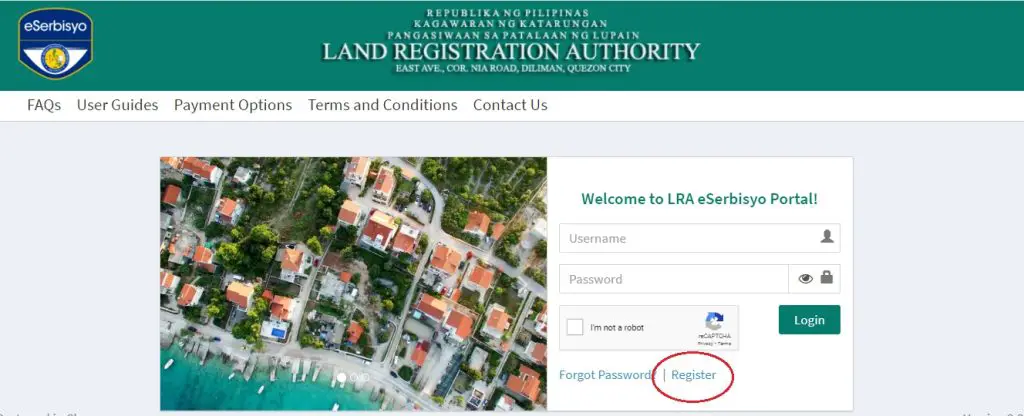
- Sign in with the portal using your username and password and click Request for Certified True Copy.
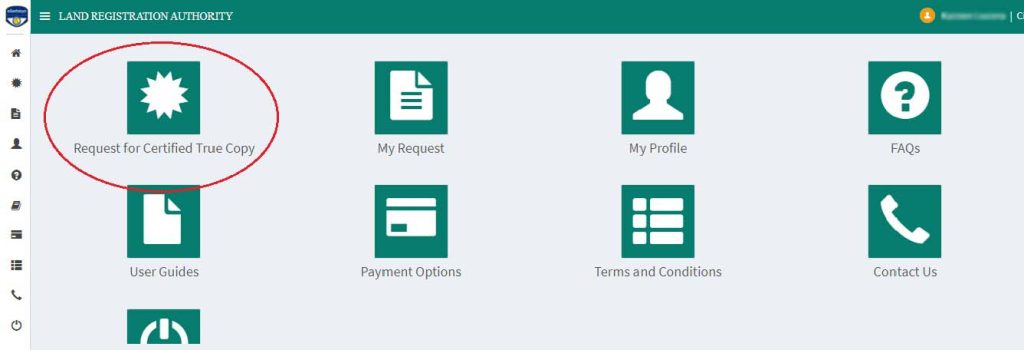
- You will be redirected to the Request for Certified True Copy page. Your name as the requestor and the shipping address will be displayed. You may edit the shipping address if it differs from your intended destination. Click Add Title. A pop-up window will then appear, requiring you to input the details.
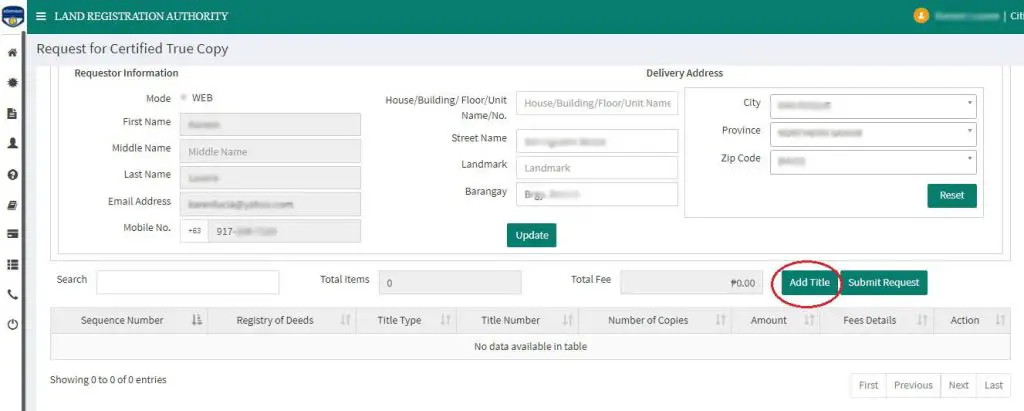
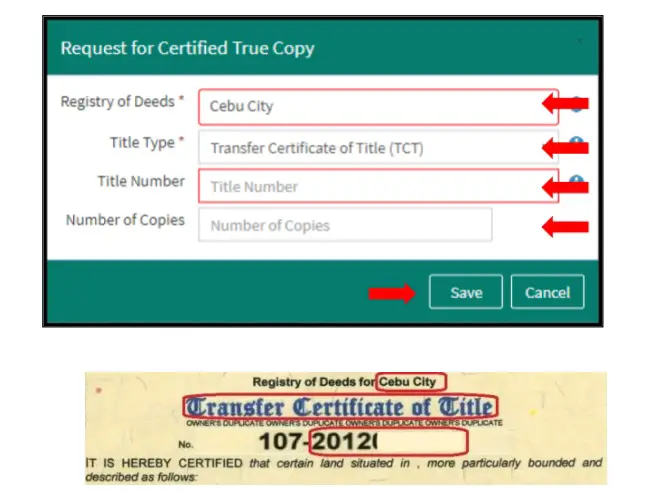
- If the title number inputted is not in the LRA database, a pop-up window will appear advising you to visit the nearest Registry of Deeds or call the number provided for assistance; otherwise, a summary of your request and the total fees are reflected on the table. Click Submit Request.
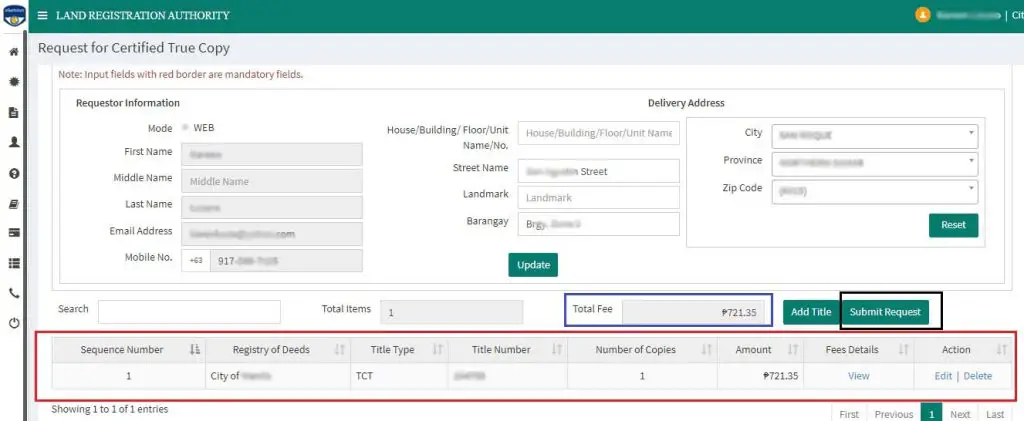
- A pop-up window will appear asking if you want to pay. Click Yes. You may either pay immediately or pay later. To pay immediately, click Make Payment and choose Landbank. You will then be redirected to the Landbank ePayment system. Provide your account details and follow the next prompt.
- After successful payment, your CTC of the title will be sent to your chosen mailing address. You should be able to receive it within 3-5 working days after payment or 5-7 working days in other cities or provinces outside of Metro Manila. For manually issued titles, additional 5-7 working days are required.
Option 2: At the Land Registration Authority (LRA)/Register of Deeds (Walk-In)
If you can’t request a CTC of the title via the eSerbisyo or get a response from the pop-up message that the title is not in the LRA database, you may go to the LRA or the Register of Deeds to apply in person.
In addition to the issuance of CTC, you can also request the following services:
- Certification
- Verification
- Parcel Verification (with lot configuration, with lot location plan)
- Title Trace Back (up to OCT x number of generations)
What To Bring:
- Valid ID of the requester. Anyone can request a CTC, Certification, or Verification even if the person is not the registered owner of the land. No Authorization Letter or Special Power of Attorney (SPA) is needed
- Title number and name of the registered owner or a photocopy of the title.
How To Request Certification, Verification, Certified True Copy, Parcel Verification, or Title Trace Back at the Land Registration Authority (LRA)/Register of Deeds: A Step-by-Step Guide
- Visit the LRA Central Office at their address in LRA Compound, East Avenue cor NIA Road, Quezon City. Alternatively, you can visit the nearest Registry of Deeds where you live.
- Get the Request Form and fill out the necessary information (i.e., the type of transaction, the requester’s name, contact number, address, purpose, etc.).
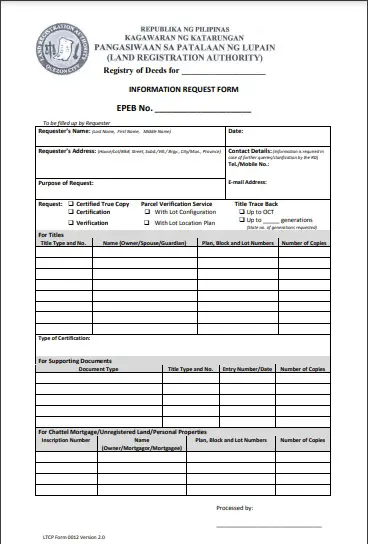
- Proceed to the cashier and pay the transaction fees. You will get a receipt and claim stub after. Below is the schedule of fees:
| Type of Transaction | Total Fees |
| Issuance of True Copies of Certificate of Title | ₱143.72 per title |
| Issuance of True Copies of other Documents | ₱143.72 per document |
| Certification on Status of Plans/Lots | ₱143.72 per plan/lot certified |
| Fee for Query/Research | ₱215.59 per title, instrument, or document |
- Return to LRA or RD to get your document from the releasing clerk on the day indicated in your claim stub. Releasing of records is usually done after 3-5 working days.
How To Track the Status of Your Request Through the Land Registration Authority Online (LRA) Tracking System
What Is the LRA Online Tracking System (LOTS)?
LOTS is a tool that provides fast and easy access to the status of your transactions with LRA. Once you lodge a request, you do not have to go back and forth to LRA or Register of Deeds to follow up on your request. You can access the website and get an instant up-to-date transaction status, thus saving you time and money.
In addition to checking the status of your request for a Certified True Copy, Certification, or Verification of land title, LOTS also provide a status update of transactions involving:
- Chattel Mortgage
- Comprehensive Agrarian Reform Program
- Personal Properties
- Registered Land
- Unregistered Land
How To Track the Status of Request Through LOTS: Step-by-Step Guide
- Access the LRA Online Tracking System

- Fill out the boxes with the correct details. At the drop-down menu:
- Choose the Register of Deeds where the title is registered
- Select the transaction type (e.g., Certified True Copy, Certification, Verification (CCV)
- Type the EPEB number. You can see this number on the receipt issued to you (see image below)
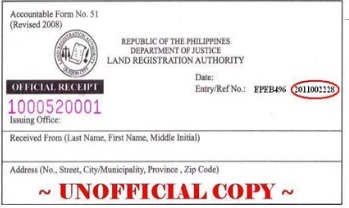
- If the data you inputted is correct, the current status of your request is displayed.
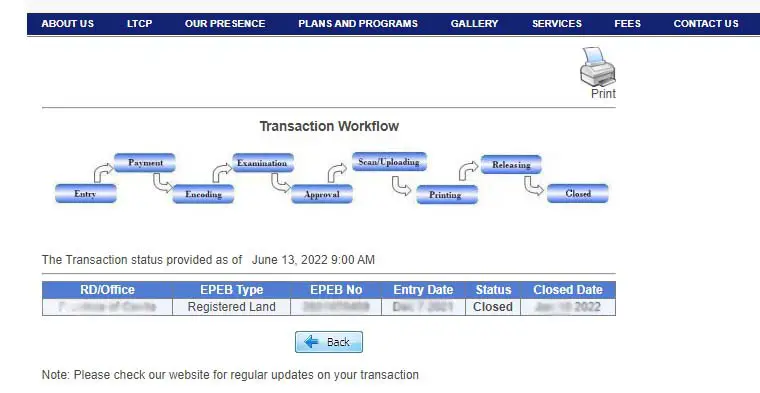
Tips and Warnings
- Always conduct due diligence when buying land. The human tendency is to get excited and immediately pay the seller or make a down payment when the price is low. However, in most cases in the Philippines, the land is problematic and has a lot of hidden issues; hence, it is always best to check or verify the land title before paying the seller.
- Take advantage of LRA’s convenient online services for checking or verifying land. It is easy, convenient, and saves you time and money.
- Always ask for a notarized Special Power of Attorney if the person you are dealing with is not the registered owner of the land to ensure you are dealing with the right person duly authorized by the owner.
Frequently Asked Questions
1. What is a clean title?
“Clean title” is a term often used to refer to a titled land with no liens or encumbrance. A lien means a charge on a property, usually to pay some debt or obligation. Encumbrance means a burden upon the land3.
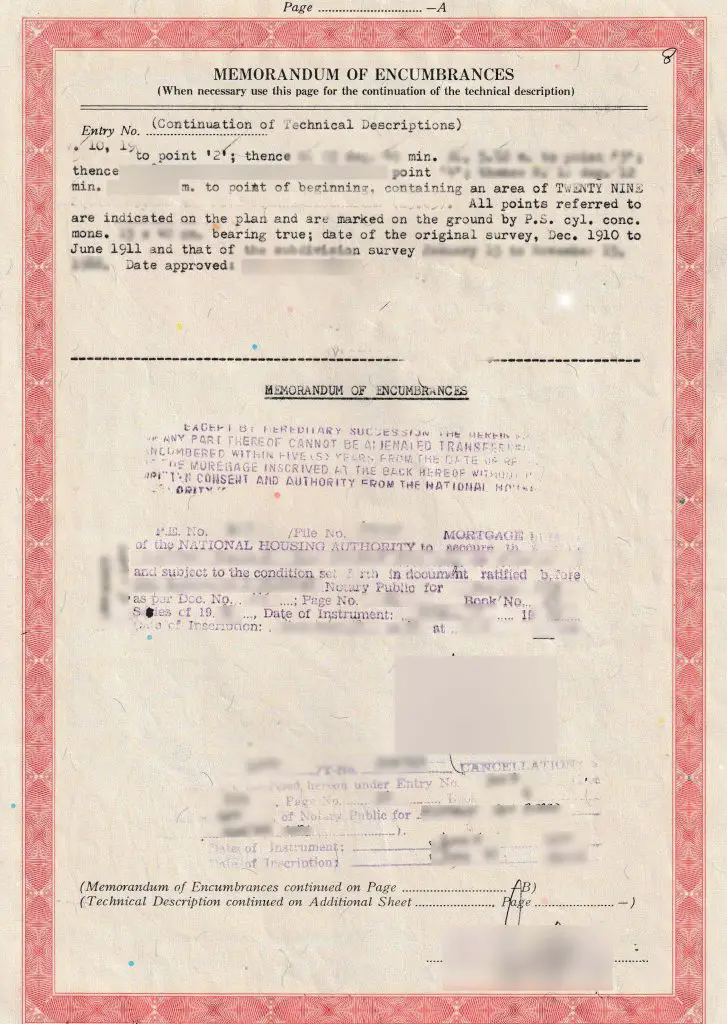 Sample of annotations in the Memorandum of Encumbrance
Sample of annotations in the Memorandum of Encumbrance
In a clean title, the Memorandum of Encumbrance (last page) is blank and has no annotations or notes (e.g., the land is not mortgaged to a bank, has no lease, and is not under litigation).
If you have a clean title, you can usually sell the land at a higher price. Suppose you are a buyer and see an annotation on the Memorandum of Encumbrance. In that case, you are notified of the risk you are entering should you buy the property despite its attendant issues.
2. I am planning to buy land. How do I know if the property is not mortgaged?
You can know if the property is not mortgaged if there are no annotations in the Memorandum of Encumbrance on the property title. You should ask the seller for a photocopy of the title and conduct your due diligence. The best thing to do is to request a Certified True Copy of the title from the LRA to check if the title is clean.
3. I am currently abroad. Can I assign someone to verify the land title for me?
Yes, you can assign someone in the Philippines to verify your title. An authorization letter is not required. You can also verify the land title by requesting a CTC online. You can do this even if you are abroad.
4. I bought land, and the seller says he only has a Tax Declaration. How do I verify that there is no title to the property I bought?
If you have some basic information about the land, you can visit the LRA Central Office or the nearest Registry of Deeds to request verification or query/research. The LRA will be able to provide you with the information you are requesting.
5. I am currently abroad, and my mother, who owns a piece of land in the Philippines, died long ago. How can I know if the property is titled, and how can I get a copy?
If your information is only the property’s address, you can start your verification at the Assessor’s Office and request the Tax Declaration of the property. The Tax Declaration contains valuable information such as a lot number and if your mother is indeed the registered owner. Once you have this information, you can search with the Registry of Deeds in the city or province where the land is situated. You can authorize someone in the Philippines to do the verification for you.
References
- People of the Philippines, petitioner, vs.The Regional Trial Court of Manila, Presided by Hon. Judge Ricarte M. Togonon and Apolinario Bataclan, Julia Bataclan, Francisca Bataclan, Napoleon Bataclan, Liliberth Bataclan and Eleazar Bataclan, respondents., G.R. No. 81541 (Supreme Court of the Philippines 1989).
- Implementing Guidelines on Electronic Registration Of Land Titles and Deeds: Rule XIII (2009).
- People of the Philippines, petitioner, vs.The Regional Trial Court of Manila, Presided by Hon. Judge Ricarte M. Togonon and Apolinario Bataclan, Julia Bataclan, Francisca Bataclan, Napoleon Bataclan, Liliberth Bataclan and Eleazar Bataclan, respondents., G.R. No. 81541 (Supreme Court of the Philippines 1989).
Written by Atty. Kareen Lucero
Atty. Kareen Lucero
Kareen Lucero is a lawyer previously doing litigation before working for different agencies in the government and for a multinational corporation. She has traveled to 52+ countries including a 3-month solo backpacking in South East Asia and more than 1 year of solo traveling across four continents in the world. As part of giving back, she is passionate about sharing her knowledge of law and travel. She is currently doing consulting work for a government agency. For inquiries, you may reach her via Facebook Messenger (https://m.me/kareen.lucero.77) or email ([email protected]).
Copyright Notice
All materials contained on this site are protected by the Republic of the Philippines copyright law and may not be reproduced, distributed, transmitted, displayed, published, or broadcast without the prior written permission of filipiknow.net or in the case of third party materials, the owner of that content. You may not alter or remove any trademark, copyright, or other notice from copies of the content. Be warned that we have already reported and helped terminate several websites and YouTube channels for blatantly stealing our content. If you wish to use filipiknow.net content for commercial purposes, such as for content syndication, etc., please contact us at legal(at)filipiknow(dot)net